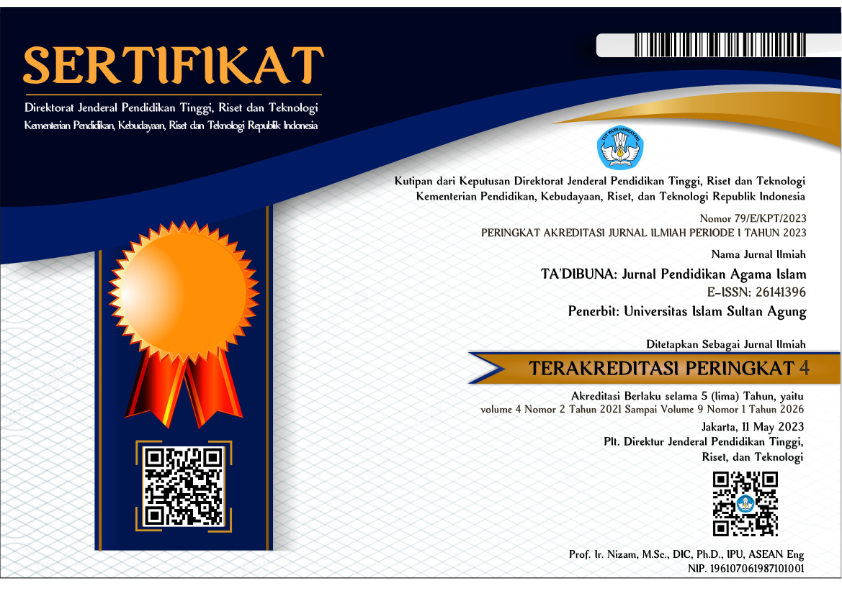Holistic Education in the Implementation of Islamic Value Morality in Inclusion Schools in The Covid 19 Pandemic Period
Abstract
Keywords
Full Text:
PDFReferences
Editors, A. H. (2013). American Hertage Dictionary of the English Language. 53(9), 1689–1699.
Hidayah, N., Suyadi, Akbar, S. A., Yudana, A., Dewi, I., Puspitasari, I., … Wat, D. E. (2019). Pendidikan Inklusi dan Anak Berkebutuhan Khusus.
Ichsan, I. Z., Rahmayanti, H., Purwanto, A., Sigit, D. V., Kurniawan, E., Dewi, A. K., … Marhento, G. (2020). PEMBELAJARAN SAINS DAN LINGKUNGAN DI SMP yang berisi himbauan kepada masyarakat untuk melakukan Physical Distancing ( menjaga. Covid-19 Dan E-Learning:Perubahan Strategi Pembelajaran Sains Dan Lingkungan Di Smp, 6, 50–61.
Ilham, D. (2019). Menggagas Pendidikan Nilai Dalam Sistem Pendidikan Nasional. 8(3), 109–122.
Kualitatif, M. P. (2013). Imam Gunawan. 1–14.
Latifah, M., & Hernawati, N. (2009). “Dampak Pendidikan Holistik pada Pembentukan Karakter dan Kecerdasan Majemuk Anak Usia Prasekolah.†Jurnal Ilmu Keluarga Dan Konsumen, 2(1), 32–40. https://doi.org/10.24156/jikk.2009.2.1.32
Machmud, H. (2014). Urgensi Pendidikan Moral dalam Membentuk Kepribadian Anak. Jurnal Al - Ta’dib, 7(2), 75–84.
Maragustam. (2015). 67 ISSN : 1829-8257 STAIN Palangka Raya. Studi Agama Dan Masyarakat, 11(1), 122–143. Retrieved from https://e-journal.iain-palangkaraya.ac.id/index.php/jsam/article/view/409/546
Maunah, B. (2016). Implementasi Pendidikan Karakter Dalam Pembentukan Kepribadian Holistik Siswa. Jurnal Pendidikan Karakter, (1), 90–101. https://doi.org/10.21831/jpk.v0i1.8615
Putry, R. (2018). Nilai pendidikan karakter anak di Indonesia perspektif KEMENDIKNAS. Gender Equality: Internasional Journal of Child and Gender Studies, 4(1), 39–54.
Rahmi, R., Hasanah, A., & Anti, S. L. (2020). Konsep Pendidikan Karakter Pada Sekolah Inklusi Tingkat Usia Dasar. AR-RIAYAH : Jurnal Pendidikan Dasar, 4(2), 155. https://doi.org/10.29240/jpd.v4i2.1648
Syaparuddin, S. (2020). Peranan Pendidikan Nonformal Dan Sarana Pendidikan Moral. Jurnal Edukasi Nonformal, 1(1), 173–186. Retrieved from https://ummaspul.e-journal.id/JENFOL/article/view/317
Widyastono, H. (2012). Muatan Pendidikan Holistik Dalam Kurikulum Pendidikan Dasar dan Menengah (Holistic Education In The Curriculum Of The Basic And Secondary Education). Jurnal Pendidikan Dan Kebudayaan, 18(4), 467–476. Retrieved from https://core.ac.uk/download/pdf/322565798.pdf
Yogiswari, K. S. (2018). Pendidikan Holistik Jiddu Krishnamurti. Guna Widya: Jurnal Pendidikan Hindu, 5(1), 33–42. https://doi.org/10.25078/gw.v5i1.610
DOI: https://dx.doi.org/10.30659/jpai.5.1.63-77
Refbacks
- There are currently no refbacks.
Ta’dibuna: Jurnal Pendidikan Agama Islam is published by the Master Program of Islamic Education, Faculty of Islamic Studies, Universitas Islam Sultan Agung (UNISSULA), Indonesia.
Jl. Raya Kaligawe Km. 4, PO BOX 1054/SM, Semarang, Indonesia 50112
Email: jurnaltadibuna@unissula.ac.id








